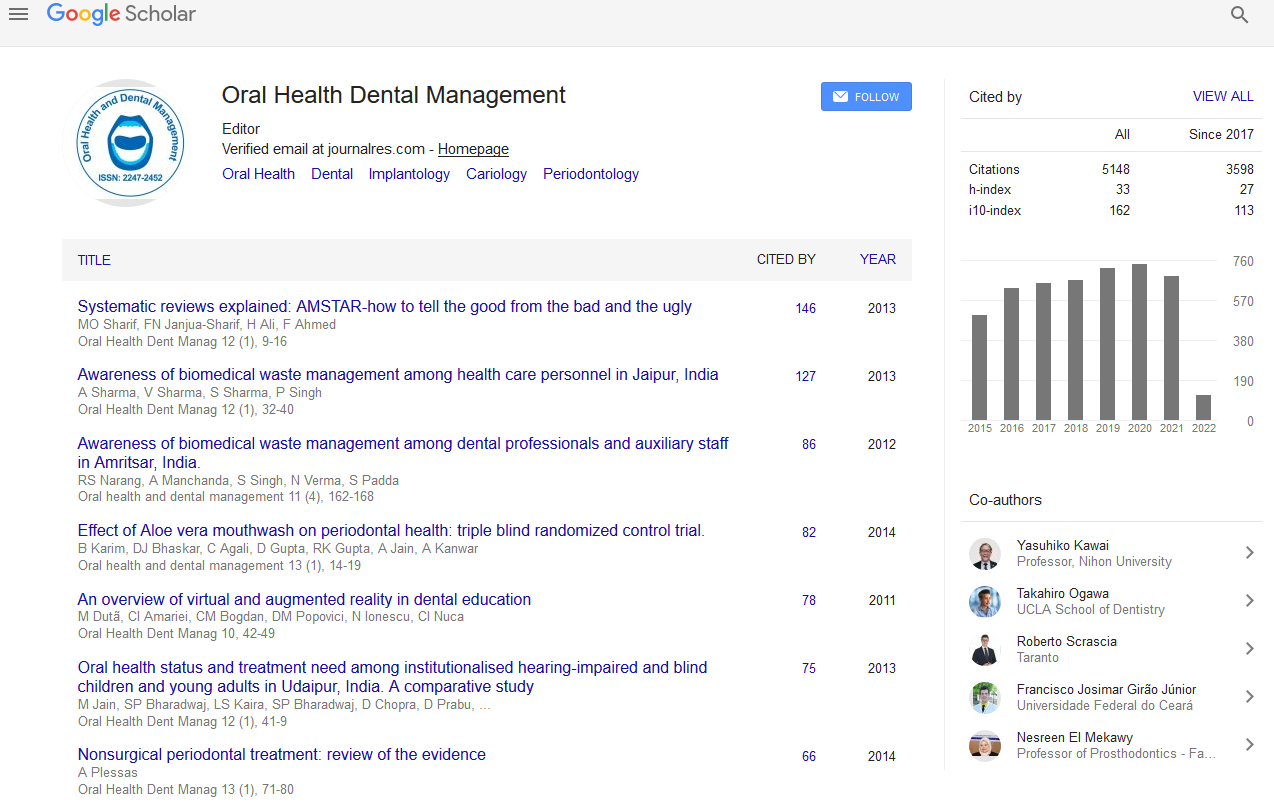Indexed In
- The Global Impact Factor (GIF)
- CiteFactor
- Electronic Journals Library
- RefSeek
- Hamdard University
- EBSCO A-Z
- Virtual Library of Biology (vifabio)
- International committee of medical journals editors (ICMJE)
- Google Scholar
Useful Links
Share This Page
Journal Flyer

Open Access Journals
- Agri and Aquaculture
- Biochemistry
- Bioinformatics & Systems Biology
- Business & Management
- Chemistry
- Clinical Sciences
- Engineering
- Food & Nutrition
- General Science
- Genetics & Molecular Biology
- Immunology & Microbiology
- Medical Sciences
- Neuroscience & Psychology
- Nursing & Health Care
- Pharmaceutical Sciences
Effects of thermal cycles and immersion in different beverages on color, translucency and hardness of different composite resins
8th International Conference and Exhibition on Dentistry & Oral Care
April 18-20, 2016 Dubai, UAE
Pinar Gul
Ataturk University, Turkey
Scientific Tracks Abstracts: Oral Health Dent Manag
Abstract:
Aim/Objectives: The aim of this study is to evaluate the color stability, translucency and hardness of eight different composite resins, after thermal cycling and immersion in beverages. Methods: Six light-cured dimethacrylate-based composite (Clearfil Majestry Esthetic, Clearfil Majestry Posterior, Grandio, Grandio Flow, Arabesk Top, Valux Plus), ormocer (Admira) and silorane-based composite (Filtek Silorane) were tested in this study. Fifteen specimens (8x2 mm) of each composite were prepared. All samples were subjected to thermal cycling [(5.0±0.5)~(55.0±1.0)°C, 1000 cycles]. After thermal cycling, fifteen specimens in each group were divided into three subgroups (n=5): distilled water (control), coffee and red wine at 37°C for 30 days. With a spectrophotometer, the �?E and Translucency Parameter (TP) were calculated against white and black backgrounds. Color, translucency and hardness of all samples were remeasured baseline, after thermal cycles and after immersion in beverages. The data were analyzed using repeated measured analysis of variance and Bonferroni multiple-comparison test (P<0.05). Results: Red wine and coffee caused perceptible discolorations in all composite resin materials (�?E>3.3). The effect of thermal cycles on color and translucency was no statistically significant (P>0.05). TP values generally decreased especially after immersion in red wine (P<0.05). Hardness values were varied among composite resins but generally decreased after thermal cycles and immersion especially in red wine. Conclusions: Thermal cycling and immersion in beverages caused to decrease in hardness values for composite materials. Because of negative effects on color and translucency, it should be noted especially red wine consumption.
Biography :
Pinar Gul graduated from Faculty of Dentistry, Atatatürk University in 2005. In the same year, she started her PhD in the division of Restorative Dentistry of Atatürk University. She received her PhD in 2012 and in same year, she became Assistant Prof. at the Faculty of Dentistry, Atatürk University.
Email: opinargul@hotmail.com

